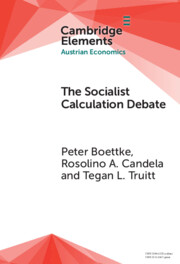Refine search
Actions for selected content:
3 results

The Socialist Calculation Debate
- Theory, History, and Contemporary Relevance
-
- Published online:
- 29 November 2024
- Print publication:
- 19 December 2024
-
- Element
- Export citation
Conclusion
-
- Book:
- Economic Theory and the Roman Monetary Economy
- Published online:
- 03 February 2020
- Print publication:
- 20 February 2020, pp 173-176
-
- Chapter
- Export citation
Chapter 4 - Rationality, Purposefulness and Action
-
- Book:
- Economic Theory and the Roman Monetary Economy
- Published online:
- 03 February 2020
- Print publication:
- 20 February 2020, pp 75-109
-
- Chapter
- Export citation
